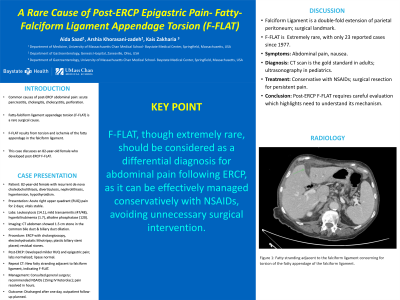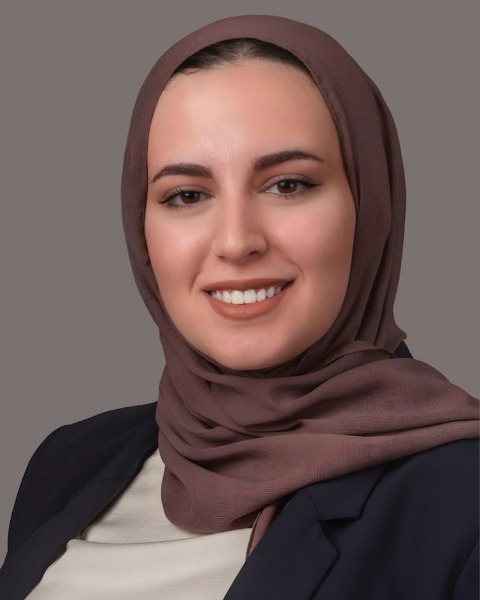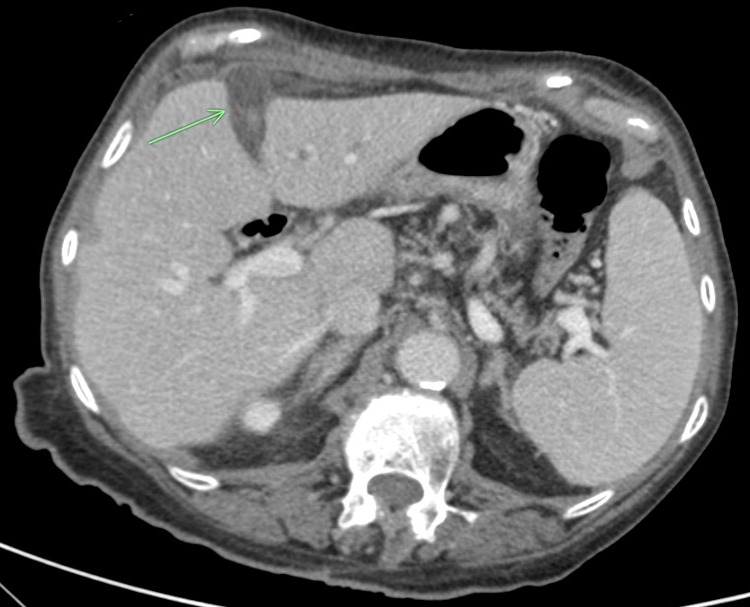Tuesday Poster Session
Category: Interventional Endoscopy
P4507 - A Rare Cause of Post-ERCP Epigastric Pain: Fatty-Falciform Ligament Appendage Torsion
Tuesday, October 29, 2024
10:30 AM - 4:00 PM ET
Location: Exhibit Hall E

Has Audio

Aida Saad, MD
Baystate Medical Center
Enfield, CT
Presenting Author(s)
Award: Presidential Poster Award
Aida Saad, MD1, Arshia Khorasani-zadeh, MD2, Kais Zakharia, MD3
1Baystate Medical Center, Enfield, CT; 2UMass Chan, Baystate, Springfield, MA; 3Baystate Medical Center, Springfield, MA
Introduction: Acute pancreatitis, cholangitis, cholecystitis, and perforation are causes of post-endoscopic retrograde cholangiopancreatography (ERCP) abdominal pain. Fatty-falciform ligament appendage torsion (F-FLAT) is a rare surgical cause of abdominal pain. It arises from torsion and ischemia of the fatty appendage within the falciform ligament. In this report, we discuss an 82-year-old female who developed post-ERCP F-FLAT.
Case Description/Methods: 82-year-old female with a past medical history of recurrent de novo choledocholithiasis (requiring multiple ERCPs despite cholecystectomy and Ursodiol), diverticulosis, nephrolithiasis, hypertension, and hypothyroidism. She presented with acute right upper quadrant pain (RUQ) for two days. She was vitally stable, with labs showing leukocytosis 14.1, mild transaminitis 47/48, hyperbilirubinemia 1.7, and alkaline phosphatase 120. CT abdomen showed a 1.5 cm stone in the common bile duct with intrahepatic and extrahepatic biliary duct dilation. ERCP with cholangioscopy and electrohydrostatic lithotripsy was performed. A plastic biliary stent was placed. Due to the significant stone burden, several stones remained. Immediately after the ERCP, the patient developed RUQ and epigastric abdominal pain, which was milder compared to admission. It was reproducible to palpation with no concern for peritonitis. Repeat labs were consistent with LFT normalization and normal lipase. Repeat CT abdomen showed new fatty stranding adjacent to the falciform ligament concerning for torsion of the fatty appendage of the falciform ligament. General surgery was consulted and recommended management with Non-Steroidal Anti-inflammatory Drugs (NSAIDs) with no surgical intervention. The pain resolved within a few hours of 15mg intravenous Ketorolac. The patient was discharged one day later for outpatient follow-up.
Discussion: The falciform ligament, a double-fold extension of the parietal peritoneum, divides the liver and is considered a surgical landmark. F-FLAT is extremely rare; only 23 cases have been reported since 1977. Symptoms include abdominal pain and nausea. Diagnosing F-FLAT is challenging; a CT scan is the gold standard in adults and ultrasonography in pediatrics. Fortunately, F-FLAT is self-limiting, and treatment is conservative with NSAIDs. Surgical resection is reserved for persistent pain. In our case, F-FLAT occurred post-ERCP, highlighting the need for careful evaluation and understanding of its mechanism.

Disclosures:
Aida Saad, MD1, Arshia Khorasani-zadeh, MD2, Kais Zakharia, MD3. P4507 - A Rare Cause of Post-ERCP Epigastric Pain: Fatty-Falciform Ligament Appendage Torsion, ACG 2024 Annual Scientific Meeting Abstracts. Philadelphia, PA: American College of Gastroenterology.
Aida Saad, MD1, Arshia Khorasani-zadeh, MD2, Kais Zakharia, MD3
1Baystate Medical Center, Enfield, CT; 2UMass Chan, Baystate, Springfield, MA; 3Baystate Medical Center, Springfield, MA
Introduction: Acute pancreatitis, cholangitis, cholecystitis, and perforation are causes of post-endoscopic retrograde cholangiopancreatography (ERCP) abdominal pain. Fatty-falciform ligament appendage torsion (F-FLAT) is a rare surgical cause of abdominal pain. It arises from torsion and ischemia of the fatty appendage within the falciform ligament. In this report, we discuss an 82-year-old female who developed post-ERCP F-FLAT.
Case Description/Methods: 82-year-old female with a past medical history of recurrent de novo choledocholithiasis (requiring multiple ERCPs despite cholecystectomy and Ursodiol), diverticulosis, nephrolithiasis, hypertension, and hypothyroidism. She presented with acute right upper quadrant pain (RUQ) for two days. She was vitally stable, with labs showing leukocytosis 14.1, mild transaminitis 47/48, hyperbilirubinemia 1.7, and alkaline phosphatase 120. CT abdomen showed a 1.5 cm stone in the common bile duct with intrahepatic and extrahepatic biliary duct dilation. ERCP with cholangioscopy and electrohydrostatic lithotripsy was performed. A plastic biliary stent was placed. Due to the significant stone burden, several stones remained. Immediately after the ERCP, the patient developed RUQ and epigastric abdominal pain, which was milder compared to admission. It was reproducible to palpation with no concern for peritonitis. Repeat labs were consistent with LFT normalization and normal lipase. Repeat CT abdomen showed new fatty stranding adjacent to the falciform ligament concerning for torsion of the fatty appendage of the falciform ligament. General surgery was consulted and recommended management with Non-Steroidal Anti-inflammatory Drugs (NSAIDs) with no surgical intervention. The pain resolved within a few hours of 15mg intravenous Ketorolac. The patient was discharged one day later for outpatient follow-up.
Discussion: The falciform ligament, a double-fold extension of the parietal peritoneum, divides the liver and is considered a surgical landmark. F-FLAT is extremely rare; only 23 cases have been reported since 1977. Symptoms include abdominal pain and nausea. Diagnosing F-FLAT is challenging; a CT scan is the gold standard in adults and ultrasonography in pediatrics. Fortunately, F-FLAT is self-limiting, and treatment is conservative with NSAIDs. Surgical resection is reserved for persistent pain. In our case, F-FLAT occurred post-ERCP, highlighting the need for careful evaluation and understanding of its mechanism.

Figure: Fatty stranding adjacent to the falciform ligament concerning for torsion of the fatty appendage of the falciform ligament.
Disclosures:
Aida Saad indicated no relevant financial relationships.
Arshia Khorasani-zadeh indicated no relevant financial relationships.
Kais Zakharia indicated no relevant financial relationships.
Aida Saad, MD1, Arshia Khorasani-zadeh, MD2, Kais Zakharia, MD3. P4507 - A Rare Cause of Post-ERCP Epigastric Pain: Fatty-Falciform Ligament Appendage Torsion, ACG 2024 Annual Scientific Meeting Abstracts. Philadelphia, PA: American College of Gastroenterology.

